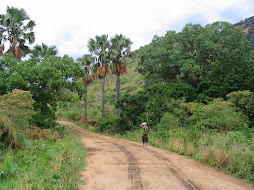






This is a press release I wrote for CRS after marching through Ikotos against gender-based violence:
Ikotos Advocates Against Gender-based Violence March, 8 December, 2007
"To whom does it belong?! To whom does it belong?!" Shouts the Ikotos Advocates Against Gender-based Violence, on the marking day of "16 Days of Activism Against Gender-based Violence", in solidarity with others around the world marching to create a voice for human rights. The Ikotos-based group has been facilitated by the Catholic Relief Service-- Ikotos, Peacebuilding Intervention, in partnership with the Catholic Diosis of Torit, Lutheran World Federation, Norwegian Peoples Aid, Norwegian Church Aid, Sudanese Women's Voice for Peace, and the local authorities. The Ikotos-based group's mission statement is to celebrate and protect the integrity of all creation, and are committed to promote and practice peace, justice, and reconciliation.
Today, the group began the march at Commisioner's office, and after a speech by the commissioner, they marched through the market, into the compounds of NGOs such as LWF, NCA, and CRS, ending at the compound of CDOT. They carried signs that stated root problems of gender-based violence. Statements such as "Women Can Do It! Leadership, Empowerment, and Decision Making."
After the today's rally the group had a round table discussion on ways and means to generate economic empowerment, as one way of preventing violence in the community. One income generating activity the group decided on was uniform production. Currently, the uniforms for the local area schools are made in nearby Uganda. Traditionaly, tailoring is a man's job because it is not becomming of a woman to straddle the sewing machine. Today, that is not so much a problem, but rather only the lacking of the skills to do it. The group is currently looking for financial backing to begin this project.
Harmful Traditional Practices:
~Compensation: compensating death by killing, with young girls. For example, yesterday in the office of the courts, a 10 year old girl was to be given to the family of the victims of a killing, by the family of the murderer to avoid legal punishment. In this community, it is customary law to give a young girl in replacement of the murderer going to jail.
~"A baby girl to become a wife." Early and forced marriages are highly practiced in this community. Girls are given to marriage at puberty in the exchange of cattle and goats. Most of time, the girls are not mature enough for marriage. The girl can be as young as twelve years old and be given to a man in his late forties. These girls are then expected to bare children within the first six months, before their body is capable of delivery.
~Inheritance. When a man dies, his wife is given to his brother or male-relative in marriage, without the woman's permission or without her or the relative being tested for HIV.
Women Can Do it! Empowerment, Leadership, and Decision Making:
The Ikotos advocate group is encouraging women to be educated, leaders, and to make their own decisions on issues related their own welfare. Currently, women are still property in South Sudan.
Say 'No' to Domestic Violence:
In Ikotos, the traditional practice of husbands is to discipline their wives with abuse in the name of love. The men believe that this is the only way to teach a woman right from wrong. It is customary law in South Sudan that a woman who is beaten by her husband is not allowed to flee the home. As a result of fleeing, the woman can be arrested by the police.
The Use of Guns in Public Places:
Because of armed conflict, small weapons are readily available and mis-used in public places such as bars, schools, marketplaces, and church. In this community there is no gun control or legal action in place for gun violence.
Support Equal Opportunity of All Children:
Education for all children is important to stop violence in the community and in the home. When the men are educated, they do not raid cattle and they are less likely to abuse their wives; and when women are educated they are more likely get a job and support their families on their own and are less likely to have a husband who abuses them.
Say 'No' to School Drop-outs:
In Ikotos this year, one school alone reported 59 girls and 37 boys dropped out in the first term for various reasons. Some of the girls (even in primary) drop out due to pregnancy. In one instance, a girl as young as primary three dropped out of school this year because she was pregnant. Many of the students are forced to drop out of school because of lack of money for school fees. Several of the students are orphaned by the 21-year conflict in Southern Sudan. As of print, there are no official statistics in South Sudan for the reasons of drop-out.

































No comments:
Post a Comment